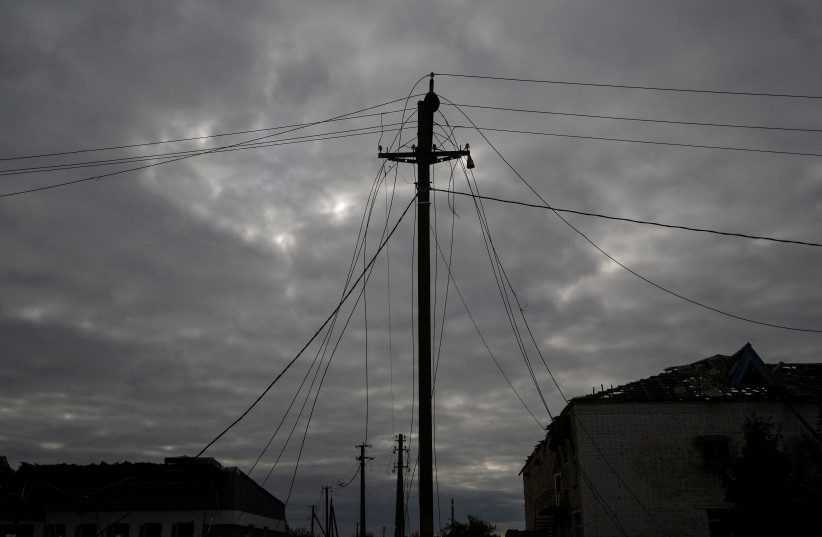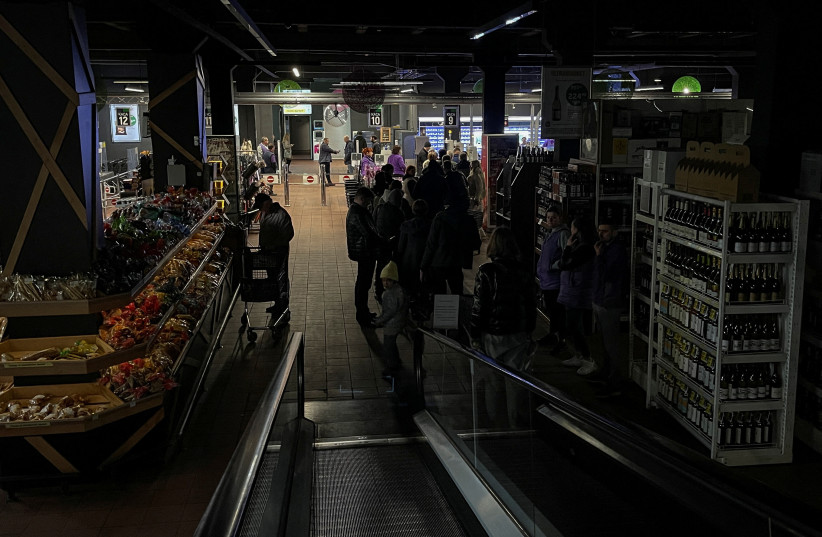In the Ukrainian capital of Kyiv, local authorities are preparing for the possibility of a total power blackout, and the evacuation of three million residents.
Ukraine's national grid has been severely damaged by Russian airstrikes in recent weeks, with estimates suggesting that over 40% of Ukraine's energy infrastructure is damaged or destroyed.
An energy company in the Russian-held Ukrainian city of Kherson on Sunday said there is no electricity in the city, Russian state-owned news agency RIA reported.
RIA quoted the Khersonoblenergo press service as saying that the reasons for the outage, which occurred amid warnings that a battle for the strategic city could be about to begin, were being clarified.
In a statement to Ukrainian media on Saturday, Kyiv Mayor Vitali Klitschko said that while the city is doing everything it can to continue operating as normal, they are preparing to deal with the very real possibility that a total blackout will soon engulf the country's capital.

According to Klitschko, as of Friday morning, 450,000 homes in the country's capital are without electricity, one and a half times the amount that were without electricity just a few days prior.
"We are doing everything we can to prevent [a possible blackout], but let's be honest, our enemies are doing everything to leave the city without heat, without electricity, without water supply," he said.
He stressed that Kyiv city authorities are considering various scenarios in case of a blackout, including stockpiling diesel fuel, power generators, food and drinking water.
According to a New York Times report on the subject, the city is in the process of setting up 1,000 heating shelters that can double as bunkers while engineers do their best to fix bombed-out power stations despite lacking the necessary equipment.
While Klitschko did not explicitly mention the possibility of evacuating and relocating the city's residents, the director of security for the Kyiv municipal government Roman Tkachuk told the New York Times that this was indeed a possibility.
"We are doing everything we can to prevent [a possible blackout], but let's be honest, our enemies are doing everything to leave the city without heat, without electricity, without water supply."
Kyiv Mayor Vitaliy Klitschko
"We understand that if Russia continues such attacks, we may lose our entire electricity system," said Tkachuk, adding that the city's officials have been told that they will be given at least 12 hours notice if the electric grid is on the verge of total failure.
"If it reaches that point," Tkachuk said, "we will start informing people and requesting them to leave."
He stressed that the current situation is manageable and that there are no indications that a large number of civilians are fleeing Kyiv. However, he continued, the situation would rapidly change if services relying on electricity were to suddenly stop.
"If there’s no power, there will be no water and no sewage," he said. "That’s why currently the government and city administration are taking all possible measures to protect our power supply system."
Rolling blackouts aim to prevent worst-case scenario
In an attempt to limit energy consumption, Ukraine's national grid operator said on Saturday that it would be stepping up rolling blackouts in Kyiv, as well as in seven other Ukrainian regions, Reuters reported.

The blackouts aim not just to prevent the overload of the system and total loss of power, but also to allow time for infrastructure to be repaired faster than it is damaged.
The energy grid operator has not specified how long the blackouts would last but called on Ukrainians to conserve energy, particularly during the morning and evening hours.
Echoing the call of the power grid, Klitschko appealed specifically to the people of Kyiv on Friday, asking them to "save electricity as much as possible, because the situation remains difficult."
As a result of the rolling blackouts and the emergency energy stabilization schedules, some 4.5 million households across Ukraine were without energy on Thursday, with President Volodymyr Zelensky accusing Russia of "energy terrorism" as a result.
“The very fact that Russia has resorted to terror against the energy sector indicates the weakness of the enemy," he said in his nightly address. "They cannot defeat Ukraine on the battlefield and therefore they are trying to break our people in this way."
Ukrainian officials, as well as Western officials, have warned that Russia's new tactic of targeting energy infrastructure is not a coincidence, and is specifically timed to coincide with the onset of the harsh winter months.
"Russian attacks on infrastructure were planned weeks in advance," warned Ukrainian military intelligence head Kyrylo Budanov early last week. "The Kremlin uses winter as a weapon, trying to demoralize people who remain strong despite all the brutality inflicted on them by the occupiers."
